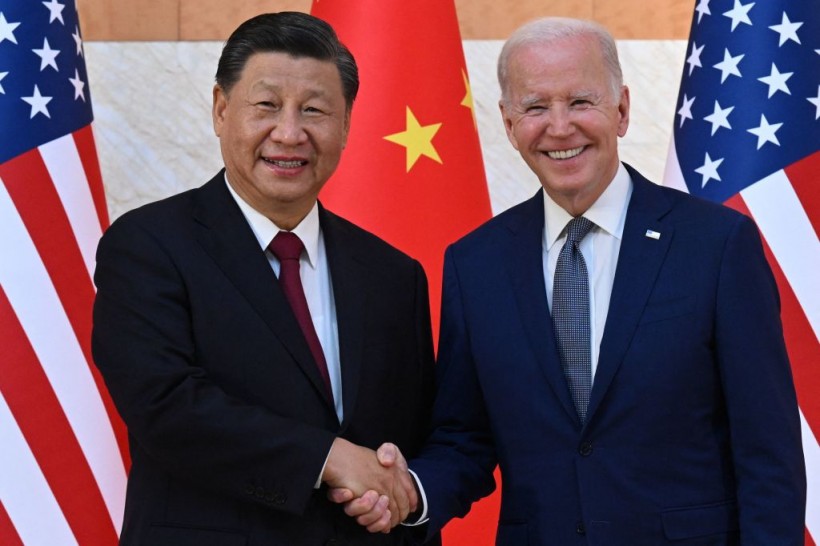
(Photo : Photo by SAUL LOEB/AFP via Getty Images)
In the lengthy meeting in Bali, the two leaders expressed a desire to mend their countries' broken ties to boost business and promote global peace and security.
United States President Joe Biden and Chinese President Xi Jinping discussed a wide variety of issues openly, including details on their goals and strategies, on Monday in Bali, Indonesia.
Here are the highlights of the highly anticipated meeting between the two heads of state:
US Wants to Prevent War Against China
President Joe Biden began his first meeting with Chinese leader Xi Jinping with a succinct explanation of his goals for the encounter. At its core, his mission is to thwart a war between the two countries.
"We share responsibility, in my view, to show that China and the United States can manage our differences, prevent competition from becoming anything ever near conflict, and find ways to work together on urgent global issues that require our mutual cooperation," he said, as reported by CNN.
On the surface, war avoidance may seem like a simple goal for the two strongest economies and militaries in the world.
In light of the current deterioration of US-Chinese ties, it is noteworthy that the Joe Biden administration has been so forthright about what they are attempting to prevent.
US officials frequently stressed their goal in meeting Xi Jinping was to create "a floor" for relations with Beijing, indicating the relationship cannot plummet further. In recent years, tensions over Hong Kong, Taiwan, the South China Sea, trade practices, and US technology limitations have derailed US-China relations.
However, US officials have indicated that during the past two months, both Beijing and Washington have made discreet attempts to mend relations. US Treasury Secretary Janet Yellen told reporters in Bali that the meeting's goal was to "stabilize the relationship between the United States and China" and create a more assured situation for American enterprises, Reuters reported.
She claimed that President Biden had made it plain to the Chinese government that limits on critical US technologies were a major national security concern, and that Biden had also voiced worries about the stability of Chinese supply chains for minerals and other essential materials.
Xi Jinping told Joe Biden the relationship between their countries did not match global expectations. The Chinese President said, "So we need to chart the right course for the China-U.S. relationship," adding that the two superpowers must choose the best path to take their bilateral ties to the next level, as reported by CNBC.
The Chinese leader said he was looking forward to working with Biden to get things back on track and that "the world expects that China and the United States will properly handle the relationship."
China's Friendship With Russia to be Tested
This year's G20 meeting will be overshadowed by the crisis in Ukraine and its economic ramifications, thus Xi Jinping's position on the conflict will be tested in his discussions with Joe Biden and during the summit itself, which will last for two days.
China has supported peace but refused to denounce the Russia-Ukraine war. Instead, Beijing denounced Western sanctions, spent record amounts on Russian energy, and blamed NATO and the United States for forcing Russia to invade Ukraine.
As Russian tanks crossed the Ukrainian border only weeks after Xi and Putin announced their nations' collaboration had "no limits," the US and its allies watched closely to see if China would provide any tangible assistance for the war effort to Putin, with whom Xi has a close personal relationship.
They have sought to pressure China to utilize its connection with Russia to end the crisis and broker peace, but Western diplomats have not stated they have discovered evidence of such assistance.
Both President Biden and President Xi reaffirmed their shared belief that nuclear war should never be waged and cannot be won, and they reaffirmed their opposition to the use or threat of using nuclear weapons in Ukraine, according to a White House readout.
Additionally, President Joe Biden expressed worry about North Korea's provocative actions. He underlined that everyone in the international community has a role in pressuring Kim Jong Un's regime to behave responsibly, and reaffirmed the United States' unwavering commitment to protecting its allies in the Indo-Pacific region. There was consensus between the two heads of state that Secretary of State Blinken should travel to China to follow up on their talks.
Related Article: G20 Summit: China, Japan Discuss Meeting Between Leaders To Address 'Strategic Distrust'








